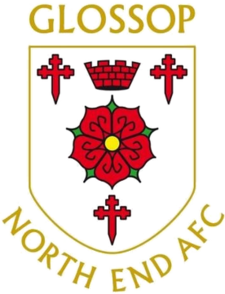Glossop North End A.F.C.

Glossop North End Association Football Club is a football club in Glossop, Derbyshire, England. Formerly members of the Football League, they currently play in the Northern Premier League Division One West and are members of the Derbyshire County Football Association. Their home ground is Surrey Street, currently known as the Amdec Forklift Stadium, which has a capacity of 1,350 (209 seated, 1,141 standing). The club play in blue, and are nicknamed the Hillmen or the Peakites. Between 1899 and 1992 the club was officially known simply as Glossop.
Glossop is one of the smallest towns in England to have had a Football League club, and it remains to this day the smallest town whose team has played in the English top flight.[1]
At the turn of the 20th century, Glossop played in the Football League First Division, the highest level of English football, for a single season. During this period the club was bankrolled by Sir Samuel Hill-Wood, who was later to become chairman of Arsenal. The club retains some connections with Arsenal.[1]
Glossop North End were founded in 1886, when they played friendly amateur matches. They played at various grounds in the town, including Pyegrove, Silk Street, Water Lane and Cemetery Road before settling at North Road. The club joined the North Cheshire League in 1890, before moving to the Combination in 1894 and turning professional. In their first season in the Combination, 1894–95, they finished as runners-up. After ending the following season, 1895–96, in third, the club moved to the Midland League and in the 1896–97 season finished as runners-up. After a second season in the Midland League, they were elected to the Second Division of the Football League in 1898–99 finishing as runners-up to Manchester City and winning promotion to the First Division.[2] They then changed their name to Glossop (primarily to avoid any confusion with Preston North End) before spending their one and only season in the top flight, 1899–1900 when they finished in last place and were relegated back to the Second Division, having won only 4 matches, all at home, against Burnley, Nottingham Forest, Blackburn and Aston Villa.
They then spent the next fifteen seasons in the Second Division, during which time they reached the quarter-finals of the FA Cup in 1908–09 where they lost to 1–0 to eventual finalists Bristol City in a replay on 10 March 1909. The club’s chairman and benefactor at the time was Sir Samuel Hill-Wood, who was later to become chairman of Arsenal. However, the club became perennial strugglers in the Second Division.[3][4]
The 1913–14 season saw a club record attendance of 10,736 for an FA Cup second round match against Preston North End on 31 January 1914.[5] However, the following season they finished bottom of the league and had to apply for re-election. This was curtailed when the start of World War I meant the Football League closed down. Glossop were then re-formed toward the end of the war by Oswald Partington, but failed to be re-elected back into the Football League. Glossop then joined the Lancashire Combination, playing just one season, 1919–20.[3][4] Northern Nomads ground-shared with Glossop for several years during this time.[citation needed] The club then dropped out of the Lancashire Combination and into the Manchester League. In the 1920s and 1930s they won the Gilcryst Cup three times and were crowned Manchester League champions in 1927–28. They won the Gilcryst Cup for a fourth time in 1947–48.[3][4]
